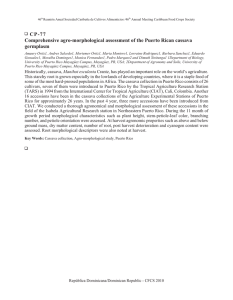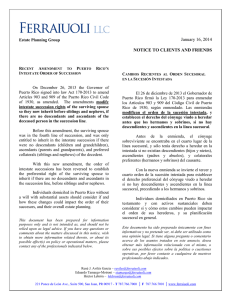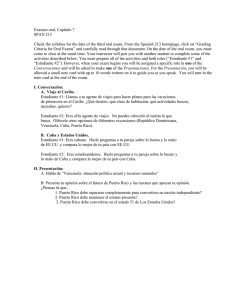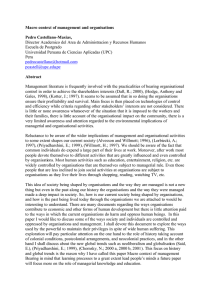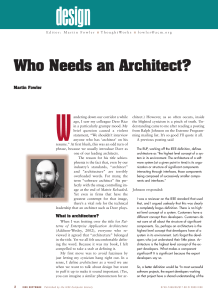interview: Chomsky - Luis Berrios Negron
Anuncio
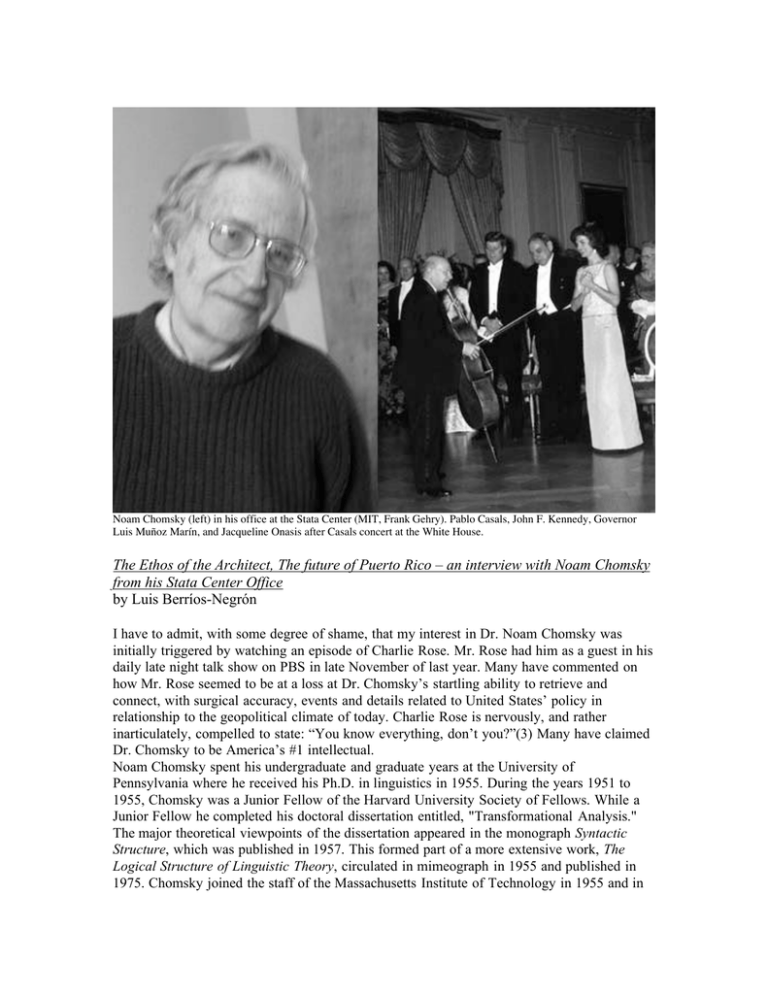
Noam Chomsky (left) in his office at the Stata Center (MIT, Frank Gehry). Pablo Casals, John F. Kennedy, Governor Luis Muñoz Marín, and Jacqueline Onasis after Casals concert at the White House. The Ethos of the Architect, The future of Puerto Rico – an interview with Noam Chomsky from his Stata Center Office by Luis Berríos-Negrón I have to admit, with some degree of shame, that my interest in Dr. Noam Chomsky was initially triggered by watching an episode of Charlie Rose. Mr. Rose had him as a guest in his daily late night talk show on PBS in late November of last year. Many have commented on how Mr. Rose seemed to be at a loss at Dr. Chomsky’s startling ability to retrieve and connect, with surgical accuracy, events and details related to United States’ policy in relationship to the geopolitical climate of today. Charlie Rose is nervously, and rather inarticulately, compelled to state: “You know everything, don’t you?”(3) Many have claimed Dr. Chomsky to be America’s #1 intellectual. Noam Chomsky spent his undergraduate and graduate years at the University of Pennsylvania where he received his Ph.D. in linguistics in 1955. During the years 1951 to 1955, Chomsky was a Junior Fellow of the Harvard University Society of Fellows. While a Junior Fellow he completed his doctoral dissertation entitled, "Transformational Analysis." The major theoretical viewpoints of the dissertation appeared in the monograph Syntactic Structure, which was published in 1957. This formed part of a more extensive work, The Logical Structure of Linguistic Theory, circulated in mimeograph in 1955 and published in 1975. Chomsky joined the staff of the Massachusetts Institute of Technology in 1955 and in 1961 was appointed full professor in the Department of Modern Languages and Linguistics (now the Department of Linguistics and Philosophy.) From 1966 to 1976 he held the Ferrari P. Ward Professorship of Modern Languages and Linguistics. In 1976 he was appointed Institute Professor. Chomsky has written and lectured widely on linguistics, philosophy, intellectual history, contemporary issues, international affairs and U.S. foreign policy. His works include Aspects of the Theory of Syntax; Cartesian Linguistics; Sound Pattern of English (with Morris Halle); Language and Mind; and Reflections on Language. (2) For the past year, as a student of architecture at MIT, I have had the humbling privilege of exchanging emails with Dr. Chomsky. After he had attended a design jury at our School of Architecture, I sent him a piece I had developed based on the insertion of a theological and photojournalism library into the upper section of a tall financial center of any global hub. He promptly responded with a minimally eloquent critique of the piece. I decided to ask him for some face time. I, bewildered throughout, kindly agreed and promptly accepted when he offered me the visit. Why would Noam Chomsky’s perceptions be relevant to architecture, or Puerto Rico for that matter, you ask? Well, I wasn’t quite sure and clearly, I am being way selfish. But, I just figured that this legendry, philosopher, contrarian, father of modern linguistics, may have remote ideas about what is it that our profession should embody in this age where we are compelled to ask those very questions to ourselves as students and/or practitioners. I adapted the latest production of Alejandro Zaera Polo, new director of the Berlage Institute in Rotterdam, Holland, which aims at stating these questions in an applicable platform. I arrive at his new office, where he kindly receives me. LB: Well, these are six questions that I loosely appropriated from HUNCH, Berlage Institute’s publication titled - Equipping the Architect for Today’s Society: The Berlage Institute in the Educational Landscape, 109 Provisional Attempts to Address Six Simple and Hard Questions About What Architects Do Today and Where Their Profession Might Go Tomorrow (1). I would like to pose these questions to you. NC: Well… I don’t anything about them, I mean I don’t know why anyone would care. LB: Well, if you don’t mind I I’ll try anyway. NC: Go ahead then. LB: What is an architect in today’s society? NC: Coming into the Stata Center constantly leaves me feeling there is some element missing in this architecture and that is the lives of the people who live inside it. Somehow they don’t enter it into the planning of the building, as if it’s a sculpture, sometimes an interesting sculpture, but you don’t want to live in a sculpture, you want to live in place that fits your concerns and needs, and at times they work but in this case they don’t. That’s the impression I constantly discover when you come into the building. LB: What is an innovative architect? NC: An innovative architect ought to combine aesthetic values with human values and also have a conception of what life is going to be like in the future. LB: How should architecture be practiced? NC: There are these students in the school of architecture that are proposing ideas on how to redesign an area of Havana. They were interesting to look at and also offered ways on how the people could organize their lives, how they fit into it, how the buildings related to the people’s work, where their lives might lead. These students worked with the community, which makes a big difference. Fomenting the idea of community, trying to save the community from otherwise being turned into a tourist trap with the big hotels, Sheraton, Hilton, rich foreign visitors, using the people for cleaning the laundry and other things… LB: What are the responsibilities of the Architect? NC: Your responsibility ought to be to provide something pleasing, uplifting to the spirit but also economically adequate, livable, useful for the way you might want to live yr life. LB: What could be an architecture laboratory? NC: It can happen anywhere, it could be right around here [Cambridge]. When I arrived fifty years ago it was no architectural or planning masterpiece, it was ugly as hell, but it was livable, there was a lot of lower, middle class housing, factories working class housing, industrial buildings, temporary roadworks into buildings which were rather comfortable… there was an opportunity, but instead they turned it into a high tech center with no people; it could have been built differently. So instead of kicking the people out, which is what happened, they could have been integrated in whatever planning was done. You could have livable housing instead of these gentrified areas. LB: How could architecture be taught today? NC: I really don’t know how it is taught, but I think that it ought to be taught in a manner which involves students working directly with the lives of the people who they are thinking about building for. The community needs to be involved, learning and teaching, an interactive process, I mean it isn’t quantum physics, it deals with humans, not with atoms. The laboratory should be community that is being worked with. LB: There is one more question I would like to ask you regarding my homeland of Puerto Rico, but I know you are very busy…. Should I leave it here and perhaps we can exchange emails later? NC: No, no, go ahead, I always have time for our students… LB: The Dominican writer-analyst, Ramón Grosfuguel, stated in one of his essays titled Migration and geopolitics in the Antilles that Puerto Rico would not only loose its military viability but that also would loose its standing as the American showcase for the Latin America due to the dismantlement of Soviet support to Cuba. Based on this statement, would you please introspect into the geopolitical status of Puerto Rico, domestically and internationally? Hardly much of a model for Latin America… I mean, it’s a completely artificial society, it has an artificially high living standards, high by Latin American standards, artificially high through American taxpayer gifts, corporations that wanted cheap labor, subsidized through giveaway so welfare, food stamps was used to try to keep the people quiet, so that the US can do with the Island whatever it wants. What they want is military bases, petrochemical plants, safe place for tourists, quiet people, and the end result is that, despite the fact that it has highly inflated living standards, half its population is in the United states, because there is no legal way to keep them out. Now that is a sign that things just did not work… that they can’t survive there. Now they live in the slums here… Frankly, I don’t think it had anything to do with Cuba. Well, Cuba is a US colony, based on the Mafia, prostitution, gambling, the military bases are not there for Cuba. Cuba has ever been a military threat, the US turned it into a military threat during the missile crisis, but that was by way of International terrorism, strangulation, and so on and so forth… you can turn anything into a military threat. Other than that, it is just a joke, I mean the whole Cuban missile crisis is just amazing as to how it is conceived. I mean, it is regarded as some sort of existential threat to the US, which in a sense it was, but, I mean, we have a right to be concerned about missiles in Cuba, but, if so, then Russia should have invaded Denmark, which was a far a greater threat to them than Cuba was to the United States. Denmark has an advanced industrial society, heavily armed, part of a hostile military alliance, which surrounded Russia with vast amounts of weapons of mass destruction, and we just take that for granted, in fact it was discussed in the internal planning documents of the Second World War, that the US had the right to surround any enemy with fearsome, offensive weaponry, that it must be completely immune to any threat, itself, and the planners thought that thoroughly. They had a nice phrase for that - a logical illogicality. On the surface it’s illogical, but it is logical, and the reason why its logical is that we are divine and everyone else is evil. So therefore the illogicality follows. I mean Osama Bin Laden would understand that perfectly, his language his conception… but this is long before Cuba. The US has now many more bases in the Latin America and Central Asia, many surrounding the Andean region, with the terrible concern that things are turning towards a populist independent direction that obviously has nothing to do with Soviet support. In fact, if you take a look into United States action into Latin American, you’d see that they were the same during the Cold War and after the Cold War, but using different pretexts. Woodrow Wilson invaded Haiti then Dominican Republic, and this was way before the Bolshevik Revolution, defending ourselves against the huns. Then we were defending ourselves against the Soviet Union which had nothing to do with anything. As soon as the Cold War was over, it continues without a change. I mean, the Berlin Wall fell in September of 1989, and we invaded Panama 2 weeks later; killed about 1000 people, kidnapped some guy they didn’t like. The only difference between that and the Cold War period is, well, it frankly was best put by Elliot Abrams, Assistant Secretary of State for Latin America when he said that this is the first time in years that the US has taken military action without the concern for Soviet action somewhere else in the world. I mean not in Latina America, that’s our turf, but somewhere else. As soon as Soviet help to Cuba stopped, the illegal Embargo was made much harsher. For years Cuba was the “tentacle” for the Soviet Union, about to “strangle” us, and what do we do? You make the attack partial, they switched the reasons, it’s not fear of the Russians, it’s now our love for democracy, as you can see when you look around the world. And, what was interesting to me was that the educated classes of the United States didn’t skip a beat: “It’s our love for democracy.” It’s like – “sorry, we’ve been lying to you for 40 years, but that’s OK, now it’s our love for democracy.” …that it doesn’t suggest anything. Well, what it suggests is that it is exactly what you read in the declassified record of if you buy the book, when international terrorism was peaking under Kennedy, that the intelligence analysis that came out, and I’m quoting, that “the very existence of the Castro Regime is successful defiance of US policy in Cuba going back 150 years, to the Monroe doctrine.” We are the Mafia Don, and our little store-keeper isn’t allowed to say – “I’m not going to pay my protection money.” And I think that runs up until today, and I think that that’s why attacks are waged with ferocious fanaticism; and the fanaticism is extraordinary. There was a recently released article explaining that any scientist here could be criminally liable for editing a submission by a Cuban scientist because they would be aiding the economy of the enemy. The Cubans are very good in biology and biotechnology and if they submit a paper that changes the economy, well, that is a crime. There are many conferences on biotechnology in Cuba. This has been a problem as many American scientists have been wanting to attend such conferences because there is good work. Some can attend through some complicated procedures… and this is somekind of fanaticism. But it has a certain rationale, and it is that it is kind of embarrassing to the United States that a poor, third world country that, through the Embargo, has been under terrorist attack for the past 45 years, has held health statistics comparable to the United States. It is that Mafia mentality, and for this I doubt there will be any major change in Puerto Rico. There are other ways to exert power, other than military bases, and you got to keep the people quiet. LB: That is interesting because, back home, a lot of people think that with the removal of the military bases in Puerto Rico, Vieques and then Roosevelt Roads, that Americans may be leaving. NC: I don’t think so. In fact there is an international redeployment going on. This has nothing to do with Puerto Rico itself. But, the things that are happening are very ominous. For example, our AeroSpace Department, it’s advanced research division, is working on a hypersonic bomber that can fly into orbit, and then suddenly penetrate the atmosphere to drop massive bombs on any target in the world. This dissolves the need for bases. The whole Space Platform for offensive weaponry that are being planned, dissolves the need for foreign basing, which is not well received. We have major problems with terrorism in Saudi Arabia, riots in the Philippines, in Hawaii, in Puerto Rico, but if you can attack anyone from space, instantly you don’t have to worry about foreign basing… there are other ways. Are you from Puerto Rico? LB: Yes, I am. NC: Around 15 years ago, I looked carefully at the economy in Puerto Rico for about 4 or 5 years, and it was literally a food stamp economy. Massive amounts of food stamps, you know, to keep the people quiet. You know, there’s a vast consumerist culture that is maintained by an underground economy. There’s corporate corruption through the lack of fiscal oversight, tax evasion, and so forth. In the mid 90’s, with the “emerging markets”, I started reading the quarterly reports from the Department of Commerce, and the foreign direct investment for Latin America went through the roof. About 50% of the United States foreign investment went to Bermuda, Cayman Islands, and Panama, and they are not building steel plants… these are ways of fleecing the American taxpayer. LB: I have been a fan of yours for a while and I always thought you would be a Professor at th the New School, or at Hunter College, and yet I find you here, on a corner office on the 8 floor of the new Gehry-designed Stata Center, next to the Aero-Space Department’s office… NC: Well, the environment is a lot freer here. For years I had been funded 100% by MIT, and yet I was facing a long jail term for resistance to the (Vietnam) War. They didn’t care. And the Pentagon, they understand something about the economy that economists don’t understand. It’s not a free market economy, it’s a State centered economy. The innovative dynamic of the economy comes from the state sector, that which we don’t allow anyone else to have, but that’s why it is here (MIT). The cutting edge economy that is created here happens when you socialize the cost and the risks, you have the public payment, only to have the corporations benefit from it. So, how do you get computers, internet, lasers, aircraft? Just take a look right across the hall into the economy department and see Alan Greenspan and let him tell you about entrepreneurial values and consumer choice… it’s ridiculous. It is not happening there, it’s happening in places like MIT. This is why 60 years ago you would see small electro-engineering firms setting up shop around here using federally funded computer systems. Now you see small biotech companies, because it is a commonly known fact that all technology in the future will be biology-based. What I mean is that the technologies like the internet were in the public domain for 30 years and then mysteriously transferred to some companies. Again, the public taking the risk, paying for it, without it even knowing it, only to fill the pockets of Bill Gates. That’s why we have this building. It makes sense, the enormous wealth of the guys that are now donating buildings comes from creative activity within the state sector of the economy, which they essentially rip off… and the Pentagon understands this and that’s why they don’t care if you are overthrowing the government, as long as you’re doing the work. I suspect that places like the New School has little control of what is going on. It is at MIT that you are encouraged to be as radical as you want to be, and that’s why it is comfortable for me. 1. Equipping the Architect for Today’s Society: The Berlage Institute in the Educational Landscape, 109 Provisional Attempts to Address Six Simple and Hard Questions About What Architects Do Today and Where Their Profession Might Go Tomorrow, HUNCH report No.6/7, dialogue between Wiel Arets and Alejandro Zaera-Polo, moderated by Roemer van Toorn, Berlage Institute, 2003 2. http://web.mit.edu/lsa2005/people/faculty.html 3. Charlie Rose, Public Broadcasting System, November 21, 2003, New York

